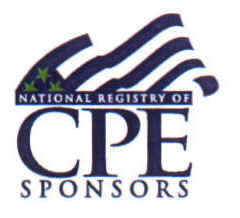 |
CPE247.com Registry # 115738 is registered with the National Association of State Boards of Accountancy (NASBA) as a sponsor of continuing professional education on the National Registry of CPE Sponsors. State boards of accountancy have final authority on the acceptance of individual courses for CPE credit. Complaints regarding registered sponsors may be submitted to the National Registry of CPE Sponsors through its website: www.nasbaregistry.org. |
| Title | Credit | Format | Price | View |
| + Governmental Accounting And Reporting | 8.0 | Online | $59.99 | View |
This course on accounting for governmental entities is intended to be used by anyone who would like to gain knowledge of accounting and financial reporting currently recommended for state and local governmental units. Click here for Course Objectives Revision Date: 2/15/2022
Additional Contents : Complete, no additional material needed |
||||
| + Not-For-Profit Accounting: Reporting and Analysis | 5.0 | Online | $44.99 | View |
Business organizations obtain resources by providing goods and services. Many not-for-profit organizations (NFPOs) obtain resources from contributors and are accountable to the providers of those resources or to their representatives. In general, GAAP requires not-for-profit organizations to issue a statement of financial position, a statement of activities, and a statement of cash flows. The focus is on the organization as a whole and on reporting assets, liabilities, and net assets; changes in net assets; flows of economic resources; cash flows, borrowing and repayment of borrowing, and other factors affecting liquidity; and service efforts. This course addresses the accounting and financial reporting for NFPOs (or NPOs) ---colleges and universities, healthcare providers, voluntary health and welfare organizations (VHWOs), and other not-for-profit entities such as religious, educational, social, recreational entities. Also addressed is financial analysis and ratios that can be useful to analyze financial fitness of NFPOs.
Field of Study Accounting Click here for Course Objectives
Revision Date: 2/27/2024
Additional Contents : Complete, no additional material needed |
||||
| + Understanding the Statement of Cash Flows | 3.0 | Online | $24.99 | View |
Cash flow is one of the most important long-term indicators for the overall financial health of a business. For a business to enjoy long-term success, sufficient cash must always be on-hand to accomplish various things including paying worker salaries, resolving immediate debts, and paying the company’s normal operating costs. Businesses also need cash on-hand to pay for expenses, repay bank loans, pay taxes, and to purchase new assets to fuel the company’s future growth. A company’s cash flow is documented in their cash flow statement. The cash flow statement, which is also known as a statement of cash flows, is a financial document that summarizes the amount of both cash and cash equivalents entering and exiting a company during a given time period. The cash flow statement provides useful context for both a company’s balance sheet and income statement and has been a mandatory part of all corporate financial reports since 1987. The cash flow report is important because it informs investors, creditors, company owners, and other interested parties of the business cash position of the company and can act as a strong indicator of a company’s overall financial health. Learning Objectives At the end of this course, students will be able to: • Identify the purpose of the statement of cash flows. • Identify the major classifications of cash flows. • Recognize the difference between net income and net cash flow from operating activities. • Calculate net cash flows from operating activities using the indirect method and using the direct method. • Recognize net cash flows from a company’s investing and financing activities. • Identify sources of information for a company’s statement of cash flows. • Recognize special problems that can surface when preparing a statement of cash flows.
CPE Credit: 3 CPE Credits for CPAs Level: Intermediate Instructional Method: Self-Study NASBA Field of Study: Accounting Program Prerequisites: Basic understanding of accounting concepts Advanced Preparation: None Revision Date: 3/29/2024
Additional Contents : Complete, no additional material needed |
||||
